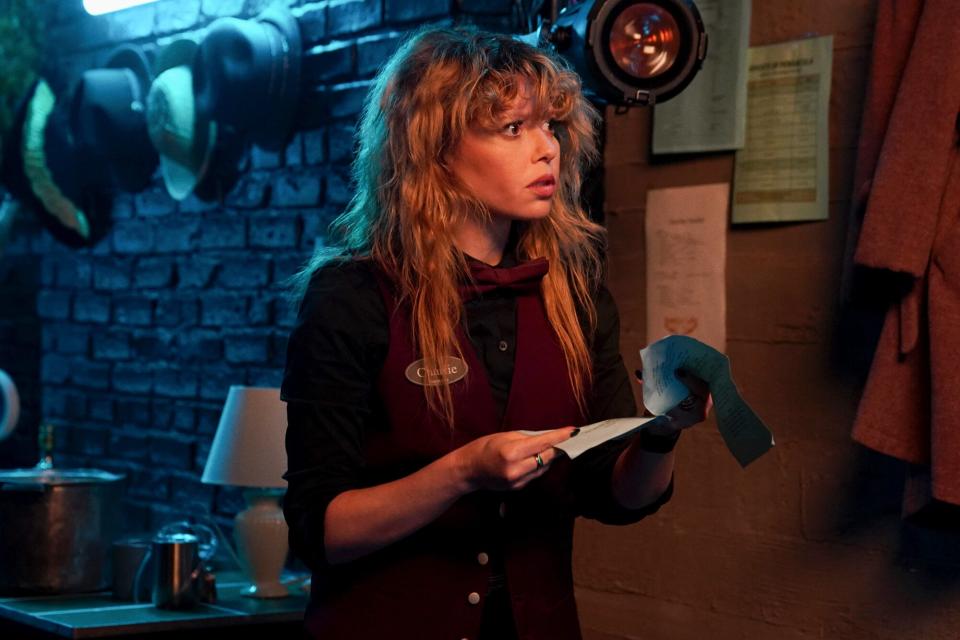Poker Face review: The crime show of the year
Natasha Lyonne comes off like the last pack of cigarettes in a world of vape pens. She leads Peacock's snazzy new series Poker Face as Charlie Cale, a casino waitress who drinks on the job and before the job. It's charming because it's Lyonne: ashy voice, molten hair, general affect of a kid who wants to be a crazy old coot. Charlie's going nowhere so slow her car won't start. Then the weekly mystery (debuting Thursday) sends her everywhere fast. She becomes an amateur detective solving perfect murders across a nation of guest stars. Poker Face rehumanizes and re-weirds TV crime, carving a third way between network franchises and prestige gloom.
The premiere begins in Frost Casino, when Natalie (Dascha Polanco) sees something illegal in a VIP's room. The maid tells her boss, who wears a horseshoe pinky ring, whose private elevator has a private bar, who is villain-ishly named "Sterling Frost Jr.", and who is played with doe-eyed sleaze by Adrien Brody. Things go wrong for Natalie in a fatal cover-up perpetrated by Sterling's enforcer, Cliff (Benjamin Bratt). Act 2 circles back in time to introduce Charlie as Natalie's friend, Sterling's employee, and a "human lie detector." She knows when you bluff about cards — or corpses.

Evans Vestal Ward/Peacock Natasha Lyonne as Charlie Cale in 'Poker Face'
Charlie wants to find out who offed Natalie. Her investigation goes so well that, by episode 2, she's on the run, off the grid, and bleeding. Powerful bads hunt her. The right move is to stay lost forever. Then someone else gets dead outside a New Mexico truck stop where Charlie just had the best Subway sandwich of her life. The trend continues wherever she parks, at a barbecue joint and a retirement home, in a heavy metal dive bar, at dinner theater. Each story cycles a helix: A killing, the hours or days before, the search for truth after. That's a familiar jagged chronology from creator Rian Johnson, who loops his Knives Out movies around flashbacks (and also made, like, Looper).
Johnson is suddenly Mystery's historian-populist, refurbishing drawing rooms for the Elon age and giving Jessica Fletcher her final IMDB credit. He writes and directs Poker Face's pilot, which glories in a few influences. Revealing whodunit before the sleuth even sleuths comes from Columbo, the legendary cop drama that also inspires the ostentatious yellow credits and Charlie's scruffy slyness. Peter Falk was a Los Angeles cop, so Lyonne's nomadic freelancing suggests other myths. "I think in another life you were, like, a knight," Natalie tells her, "Lady Galahad!" They're watching Samuel L. Jackson in Pulp Fiction deciding to walk the earth "like Caine in Kung Fu." Charlie embodies that wandering heroism — and did I mention Cliff calls Charlie "a regular little Michael Weston"? Any procedural elitist will praise Columbo: Guilty. What I didn't expect from the homage factory was sincere reverence for Burn Notice.
Those shows don't remotely exist now. Private eyes faded. USA ditched blue skies. Weekly investigations got co-opted by naval law, science cops, and Dick Wolf's ever-expanding empire. Eccentricity survived only under official oversight, as various consultants partnered with PDs or feds in The Mentalist, Bones, Castle, and The Blacklist. Premium cable and streamers prefer longform, but most seasonal mysteries are just short stories made endless. They share a grim tone of self-righteous navel-gazing. Serialization used to imply ambition; now it's lame enough for Criminal Minds. (Any exception proves the rule, which is why Stumptown died fast and there were maybe five good Sherlocks.)

Sara Shatz/Peacock Natasha Lyonne as Charlie Cale on 'Poker Face'
There's a lost mood, hippie or noir, where a no-budget free spirit proves brain cells are the most powerful weapons. The last uncanny private-eye drama was 2010's blissful Terriers. Creator Ted Griffin rediscovered the genre's class-conscious fire, pairing low-credit-score gumshoes against capitalists paving paradise to put up an airport. That echoes Columbo, the shaggy cop in a pig-pen convertible outwitting SoCal's manor class. Would you believe Griffin appears in Poker Face's pilot? Nice hat-tip from Johnson, who directed a Terriers episode written by Leslye Headland, who co-created Russian Doll with Natasha Lyonne. Loop closed.
Johnson directs the first two episodes of the 10-part season, and will direct another one. Of the six episodes released to critics, my favorites come later, when showrunners Nora and Lilla Zuckerman start riffing. Lil Rel Howery goes big as a BBQ baron. Chloë Sevigny exudes blasé swagger as a rock singer. Hong Chau is a trucker, it's awesome. This is utmost Adrien Brody, sweet yet oily. Any scene with S. Epatha Merkerson and Judith Light together is the best scene. A looming threat chases Charlie, though for now individual stories are siloed. No homicide ensemble operates the same. Deaths are impulses or heists. Many killers are financially desperate, and one sneaky point is how their private anguishes wind up looking selfish, even ridiculous.
Lyonne gets Falk's trick of letting guests peacock while she leisurely burrows. It's a thrill to watch Charlie think over clues. Savviness doesn't make her cynical. Lyonne can exude low-key sadness or genuine shock. (Her response to sudden violence is a funny marvel of real-person horror: "Oh f---. Oh, f---. What?!?! F---!") At first, I worried Charlie was too much an actor-producer's vision board: The Fugitive's Big Long Goodbye to The Rockbowski Files. Her car (which does finally start) is a blue '69 Barracuda— the show's one wrong note, very CoolRetro when a junky sedan would do. A human polygraph was ridiculous enough for Fox in 2009. (Lie to Me, fun!) It's marvelous here because Charlie's gift layers tension under every conversation. You feel how much she enjoys truth, and how disappointed lies make her.
Charlie always works whatever gig requires the least ID. So the flashbacks are also social expansions, revealing criminals and victims from an entry-level perspective. For all Poker Face's pop history, you could define it by absences. Here's a detective with no home, no gun, no phone, no supporting cast, a past to escape, and a doomed future. Hell of a hand, I'm all in. Grade: A
Related content:

 Yahoo News
Yahoo News 
